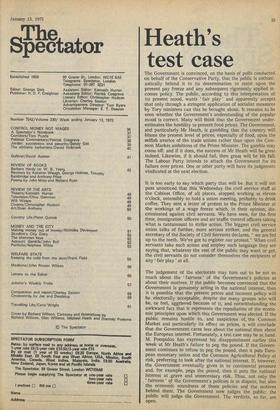Heath's test case
The Government is convinced, on the basis of polls conducted on behalf of the Conservative Party, that the public is enthusiastically behind it in its determination to insist upon the present pay freeze And any subsequent rigorously applied incomes policy. The public, according to this interpretation of its present mood, wants fair play' and apparently accepts that only through a stringent application of socialist measures by Tory ministers can this be brought about. It remains to be seen whether the Government's understanding of the popular mood is correct. Many will think that the Government underestimates the hostility to present food prices. The Government, and particularly Mr Heath, is gambling that the country will blame the present level of prices, especially of food, upon the selfish avarice of the trade unions rather than upon the Common Market ambitions of the Prime Minister. The gamble may come off: and if it does, the success of Mr Hearth will be great indeed. Likewise, if it should fail, then great will be his fall. The Labour Party intends to attack the Government for its failure over prices. One or other party will have its judgement vindicated at the next election.
It is too early to say which party that will be. But it will not pass unnoticed that this Wednesday the civil service staff at the Cabinet Office, of all places, stopped working at eleven o'clock, ostensibly to hold a union meeting, probably to drink coffee. They sent a letter of protest to the Prime Minister at the workings of a wage freeze which, in their opinion, discriminated against civil servants. We have seen, for the first time, immigration officers and Air traffic control officers 'taking what is tantamount to strike action. The biggest civil service union talks of further, more serious strikes; and the general secretary of the Society of Civil Servants declares, "we are fed up to the teeth. We've got to register our protest." When civil servants take such action and employ such language they are saying that, whatever the rest of the public may want or get, the civil servants do not consider themselves the recipients of any fair play' at all.
The judgement of the electorate may turn out to be not so much about the 'fairness' of the Government's policies as about their motives. If the public becomes convinced that the Government is genuinely acting in the national interest, then it is possible that the present prices And incomes policy will be electorally acceptable, despite the many groups who will be, or feel, aggrieved because of it, and notwithstanding the awkward fact that it represents the repudiation of the economic principles upon which this Government was elected. If the public remains hostile to, and suspicious of, the Common Market and particularly its effect on prices, it will conclude that the Government cares less about the national than about the European interest. Fortunately, a test case may be at hand. M. Pompidou has expressed 'his disappointment earlier this week at Mr Heath's failure to peg the pound. If the Government continues to refuse to peg the pound, then it puts European monetary union and the Common Agricultural Policy at risk, preferring to look after the national interest. If, however, the Government eventually gives in to continental pressure and, for example, pegs the pound, then it puts the national interest at grave and unnecessary risk. Thus, not only the ' fairness ' of the Government's policies is in dispute, but also the economic soundness of those policies and the motives behind them. The Government now judges the public; the public will judge the Government. The verdicts, so far, are open.


































 Previous page
Previous page